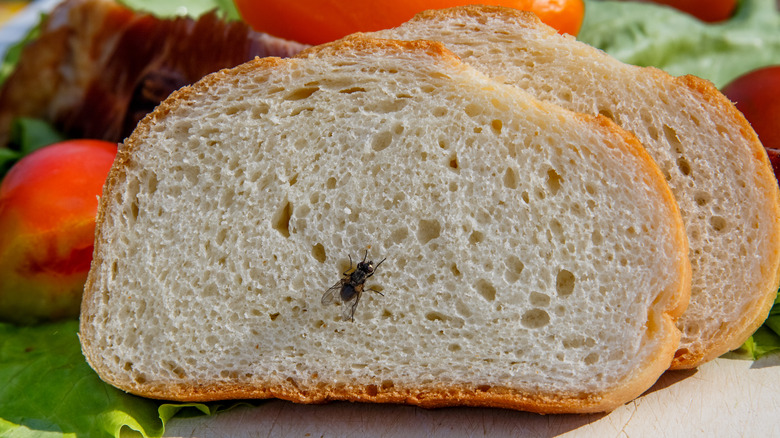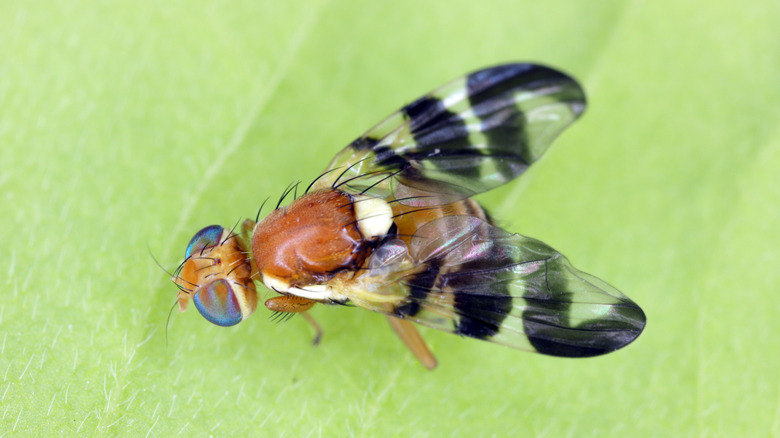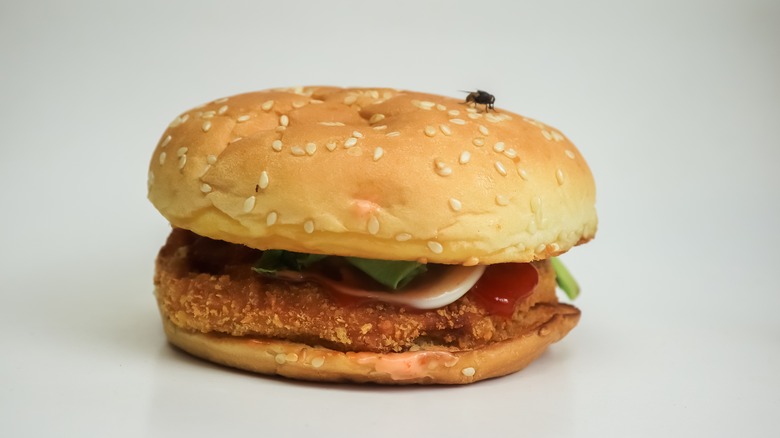What Really Happens When A Fly Lands On Your Food
On any warm-weather day, many people want to take advantage of dining outside. It's hard to beat the feeling of a light breeze and the sun on your cheeks while you sip a glass of rosé. Still, that fairytale can sometimes be cut short by a pesky fly who insists on landing on your fries.
Indoors or out, it's a sight nobody wants to see: You look away from your food for just a minute, only to turn back and notice a fly has found a new home atop your pricey meal. Or even worse, being forced to wave your hand around constantly in order to prevent said fly from setting up shop on top of your plate.
In some ways, bugs' body parts can actually enhance a recipe. But we've been told our whole lives not to let flies land on our food. Is it actually that bad? The short answer: It's not good.
Flies can carry harmful bacteria
Black flies are not picky eaters. These insects will eat anything from roadkill to a perfectly cooked steak; they'll never say no to a meal. And with that, flies often land on garbage, expired animals, and other surfaces that allow them to pick up harmful bacteria, according to Mental Floss. Since flies land on the food with their legs first, that bacteria mostly lives on their legs — meaning even a brief stop at your plate is enough to transfer that bacteria to your tasty meal. In 2017, Scientific Reports (posted at Nature) related that research conducted on flies proved they can carry potentially deadly bacteria. It turns out these bothersome bugs can be riddled with salmonella, E. coli, and H. pylori, which can all cause serious — or even deadly — food poisoning.
To make matters worse, flies can't actually chew; they have no teeth, per Mental Floss. Rather, they vomit up bile, which quickly breaks down whatever they're snacking on. It turns the solid food into a liquid so the fly can consume it. In short, a fly spending any amount of time on your food could result in your dish having harmful bacteria, plus fly vomit — neither of which makes for the best seasoning.
Fruit flies are also dangerous
Though it's well-known that those annoying black flies are a danger to food, it turns out that your summer barbecue isn't the only place you might find bacteria-ridden bugs. Rather, there are other flies that can pose the same risk, specifically fruit flies, which are much smaller than black flies and often hover around aging fruit.
You've likely seen fruit flies around your kitchen if you've ever left the fruit bowl out for a few days. These bugs are about the size of gnats, and while tiny, they can still pose a health risk. According to WebMD, fruit flies can transfer germs in the same way black flies can. Fruit flies enjoy eating rotting food, which means they often land on garbage. The flies have been found to have harmful bacteria such as salmonella, E. Coli, and listeria.
It won't take long for fruit flies to infest your home. WebMD also reports these flies can land on food and quickly lay up to 2,000 eggs. They have a short life cycle, which means those eggs hatch quickly; Within about 30 hours, the eggs have turned into maggots that feast on your food.
How to keep flies away from your food
Though it's not fun having to deal with the critters, there are steps you can take to prevent flies from settling down on your dish. To keep black flies away from the buffet table, try adding some lemons. According to Today, flies hate the smell of lemons, so if you put a few lemon wedges around the food, that could help keep the bugs away. Plus, they dress up the dish. You might need to use quite a few lemons, but Today suggests placing them in decorative bowls to help add to the ambiance.
Outdoor Happens suggests using large fans to deter the bugs from flying in the direction of the food. Plus, if it's a hot summer day, it might also cool off the guests. And if you want a solution that will also serve as a conversation starter, purchase a few Venus fly traps. The carnivorous bugs prey on insects such as flies, and their ability to capture the bugs often creates intrigue.
If fruit flies are the problem, The Spruce suggests washing and inspecting produce upon purchasing to make sure there are no fruit flies already making themselves at home. And if fruit is damaged or getting too old, throw it away.



